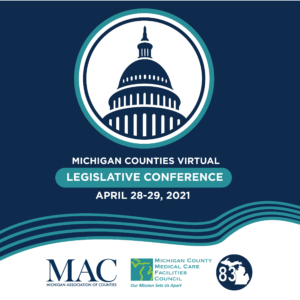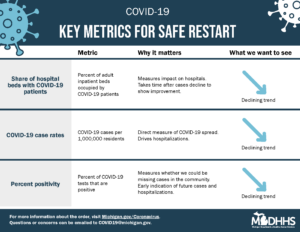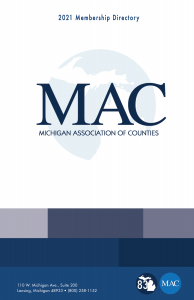New bipartisan bills introduced for 4-year commissioner terms
 Through its policy platforms, MAC has long supported moving county commissioner terms to four years from the present two. Legislation to do this made good progress in 2020 but did not reach enactment.
Through its policy platforms, MAC has long supported moving county commissioner terms to four years from the present two. Legislation to do this made good progress in 2020 but did not reach enactment.
We are back at work this year, though, with new bills — Senate Bill 242, by Sen. Ed McBroom (R-Dickinson), and SB 245, by Sen. Jeremy Moss (D-Oakland) — to bring four-year terms to Michigan, beginning with the 2024 presidential election cycle.
Even as legislation stalled out last year, MAC had productive conversations with legislators on both sides of the aisle to address concerns and tweak the language.
Passage of these bills would end Michigan’s status as one of just five states with two-year terms on all commissioners. It’s time to end that dubious distinction and bring commissioner terms in alignment with the length of those for other county elected offices across our state.
The Senate bills are now before the Senate Committee on Local Government, chaired by Sen. Dale Zorn (R-Monroe).
To aid MAC in building momentum for passage, please consider a resolution of support by your county. MAC has created a downloadable template for this purpose. If your county does approve a resolution, please be sure to send a copy to sweeney@micounties.org.
For more information on this issue, contact Deena Bosworth at bosworth@micounties.org.
Time to register for 2021 Virtual Legislative Conference
 A quartet of Michigan’s top legislative leaders have been invited to keynote one of the Plenary sessions of the 2021 Legislative Conference, April 28-29.
A quartet of Michigan’s top legislative leaders have been invited to keynote one of the Plenary sessions of the 2021 Legislative Conference, April 28-29.
Registration is now open for the virtual-only event.
Members who register by April 14 will pay only $100 for all sessions; the price increases to $125 on April 15. Elected county clerks, prosecutors, registers of deeds, sheriffs and treasurers ARE eligible for the member rate. Non-members pay $150 for the event.
House Speaker Jason Wentworth (R-Clare), Senate Majority Leader Mike Shirkey (R-Jackson) and House Minority Floor Leader Yousef Rabhi (D-Washtenaw) are confirmed for the roundtable discussion, which will be taped in late April. A Senate Democratic member has not been identified. If you have questions for this panel, MAC is now collecting them. Submit your questions for the legislators to sweeney@micounties.org by April 14. Please put “quadrant question” in the subject line of your email.
The conference also will feature:
- Plenary addresses by National Association of Counties President Judge Gary Moore of Kentucky and Executive Director Matt Chase
- A Legislative Update on the 2021 session
- Twelve workshops tailored to MAC members and four for MCMCFC members
CE for MCMCFC members
The MCMCFC Workshops have been submitted to the Ohio Nurses Association (ONA) and National Association of Long Term Care Administrator Boards (NAB) for approval to award NHA continuing education credits and nursing contact hours.
MAC and MCMCFC appreciate the support of our “early-bird” sponsors: Blue Cross Blue Shield of Michigan, Enbridge, MMRMA, MAC Service Corp., Michigan Counties Workers’ Compensation Fund and Bradford Printing.
MAC-backed veterans bill clears House
 Another step forward in updating the county veteran service fund to reflect the realities of grant implementation and response to emergent relief efforts was taken this week as the House gave strong, bipartisan support to a MAC-backed bill.
Another step forward in updating the county veteran service fund to reflect the realities of grant implementation and response to emergent relief efforts was taken this week as the House gave strong, bipartisan support to a MAC-backed bill.
House Bill 4122, by Rep. Annette Glenn (R-Midland) reflects the work of MAC and the Michigan Veteran Affairs Agency (MVAA) to adapt statutory changes needed as experience identifies what structures work and what do not. Among the MAC-supported changes in the bill are:
- Allowing grant funds to be expended for direct financial assistance for an emergent relief program (as counties continue to navigate through COVID-19 response, ensuring proper care and resources for our veteran community will remain a priority)
- A 60-day window for the MVAA to distribute the grant, once approved by the county
- A limited reduction in the county maintenance of effort (MOE) requirement to support hard-pressed counties (counties are not able to reduce the funding and supplant the reduction)
- An exemption for the 20 hours per week staffing requirement, if approved by MVAA
MAC appreciates the support of members who used our Phone2Action system to send messages of support to their state representatives. The bill now moves to the Senate Families, Seniors and Veterans Committee, chaired by Sen. John Bizon (R-Calhoun).
For questions, contact Meghann Keit-Corrion at keit@micounties.org.
How to navigate questions on in-person vs. hybrid vs. digital
 With state health orders reducing restrictions on indoor gatherings and hospitalization rates showing marked improvement in recent weeks, MAC has been fielding questions from members about moving out of purely virtual county board sessions.
With state health orders reducing restrictions on indoor gatherings and hospitalization rates showing marked improvement in recent weeks, MAC has been fielding questions from members about moving out of purely virtual county board sessions.
First, it’s important to remember two key dates in play about board meetings:
- March 31, 2021 – This is the last day that public boards can hold virtual sessions for “any reason” under provisions of the October and December 2020 changes to the state’s Open Meetings Act (OMA).
- Dec. 31, 2021 – This is the last day that public boards can hold virtual sessions IF they have adopted a State of Emergency (SOE) resolution. A template for such a resolution is on MAC’s COVID Resources Page.
Next, boards must navigate the competing requirements of public access under OMA with the restrictions on gatherings under orders from the Michigan Department of Health and Human Services (no more than 25 persons) and/or local health departments.
Scenario 1: In person meeting with no declared state of emergency after 3/31/21
If your county wants to hold an in-person session and posts it as in-person at a physical address (say, the courthouse), the county may not turn away members of the public who arrive to attend the open meeting. Of course, this could lead to rooms exceeding proper capacity under COVID health orders.
One option is to plan for overflow room(s) with two-way communication for members of the public. However, absent the authority for a virtual meeting (e.g. state of emergency declaration after 3/31) requiring the public to leave because of the capacity limitations would violate the OMA.
Scenario 2: In person meeting with a declared state of emergency after 3/31/21
If, however, your county has a state of emergency declaration in place after 3/31 and posts the meeting as “virtual” or “hybrid” then it can proceed with some county personal (including commissioners) in the courthouse while the public is required to participate via two-way remote connections. This would also afford commissioners the option to participate in the meeting virtually.
That does not mean a posted in-person public meeting may not permit the public to participate via Zoom (absent a state of emergency declaration after 3/31) but permitting/encouraging/requesting virtual participation is different from requiring it or otherwise turning the public away from an in person meeting.
As always, county boards are advised to consult with their corporate counsel to ensure procedures are following all relevant state laws.
MDHHS modifies health order, eases sports attendance rules
 The Michigan Department of Health and Human Services (MDHHS) updated its Gatherings and Mask epidemic order, the department announced Friday, allowing up to 20 percent capacity in outdoor stadiums and arenas that establish infection control plans. The update also increases testing for youth ages 13-19 to ensure athletes can safely participate in sports. The changes to the Order go into effect Monday, March 22, and remain in effect through Monday, April 19.
The Michigan Department of Health and Human Services (MDHHS) updated its Gatherings and Mask epidemic order, the department announced Friday, allowing up to 20 percent capacity in outdoor stadiums and arenas that establish infection control plans. The update also increases testing for youth ages 13-19 to ensure athletes can safely participate in sports. The changes to the Order go into effect Monday, March 22, and remain in effect through Monday, April 19.
“More than 3.2 million doses of the safe and effective COVID vaccines have been administered in Michigan, and we are well on our way to vaccinating 70 percent of Michiganders ages 16 and up,” said Dr. Joneigh Khaldun, chief medical executive and chief deputy for health at MDHHS, in the departmental release.
MDHHS had been closely monitoring three metrics for stabilization or declines over the past several weeks. Michigan’s metrics have been increasing for the past few weeks. The presence of more infectious variants, such as the B 1.1.7 variant, threatens our progress in control of the epidemic and MDHHS will be monitoring data closely. In recent days:
- Positivity rate: has increased for four weeks to 6.2%. This metric is up 177% from the mid-February low but remains below the December high of 19.4%.
- Statewide case rate: This metric has increase over the past four weeks to 172.9 cases per million. The rate is up 77% from the low in mid-February but remains below peak of 737.8 cases per million on Saturday, Nov 14.
- Hospital capacity dedicated to COVID-19 is now at 4.9%. This metric peaked at 19.6% on Tuesday, Dec. 4 and is now up 25% from an end of February low.
And, to ensure consistency with recently issued CDC guidance, fully vaccinated individuals may now participate in residential gatherings with other fully vaccinated individuals without wearing a mask.
The latest information is available at Michigan.gov/Coronavirus and CDC.gov/Coronavirus. To learn more about the COVID-19 vaccine, visit Michigan.gov/COVIDVaccine.
 Staff picks
Staff picks
- One year into pandemic, these numbers frame Michigan’s uneven recovery (Bridge Magazine)
- Where Americans are moving — and why they really are doing it (Governing)
- So you want to do an infrastructure project? (Niskanen Center)
- Arctic walrus takes a nap on an iceberg, wakes up in Ireland (Livescience.com)

 Thursday afternoon, President Joe Biden signed the American Rescue Plan, a $1.9 trillion COVID relief package that will translate into $1.95 billion in direct federal aid to Michigan’s 83 counties.
Thursday afternoon, President Joe Biden signed the American Rescue Plan, a $1.9 trillion COVID relief package that will translate into $1.95 billion in direct federal aid to Michigan’s 83 counties. A bill opposed by MAC to extend a property tax exemption on broadband equipment moved to the House floor this week.
A bill opposed by MAC to extend a property tax exemption on broadband equipment moved to the House floor this week. Podcast 83 to discuss Capitol activity over previous week
Podcast 83 to discuss Capitol activity over previous week Visits to the local café often lead to discussion about current issues. The County Café will be no different (except that it’s on Zoom). This follow-up program to the MAC-MSUE New Commissioner School is designed to bring together both experienced and new commissioners and county leadership; present some current topics of relevance to county government; and give you a chance to talk about how these topics might impact your county and actions you can take to make the impact more positive. There will also be an opportunity for discussion following the presentation.
Visits to the local café often lead to discussion about current issues. The County Café will be no different (except that it’s on Zoom). This follow-up program to the MAC-MSUE New Commissioner School is designed to bring together both experienced and new commissioners and county leadership; present some current topics of relevance to county government; and give you a chance to talk about how these topics might impact your county and actions you can take to make the impact more positive. There will also be an opportunity for discussion following the presentation. At the panel’s invitation, Monroe County Administrator Michael Bosanac testified on trial court funding before the House Appropriations Subcommittee on the Judiciary this week. As the MAC representative on the statutorily created
At the panel’s invitation, Monroe County Administrator Michael Bosanac testified on trial court funding before the House Appropriations Subcommittee on the Judiciary this week. As the MAC representative on the statutorily created  Two versions of a massive federal response to the ongoing COVID crisis are now in play on Capitol Hill. Passage of either version would mean hundreds of millions of dollars for Michigan counties.
Two versions of a massive federal response to the ongoing COVID crisis are now in play on Capitol Hill. Passage of either version would mean hundreds of millions of dollars for Michigan counties. The Senate and House agreed this week
The Senate and House agreed this week  Counties will receive almost $5 million from revenue collected on marijuana businesses in fiscal year 2020. The state began distributions on Thursday.
Counties will receive almost $5 million from revenue collected on marijuana businesses in fiscal year 2020. The state began distributions on Thursday. A new webinar will “explore interdisciplinary partnership and collaboration efforts from three innovative Michigan communities” in the intersection of public safety and mental health.
A new webinar will “explore interdisciplinary partnership and collaboration efforts from three innovative Michigan communities” in the intersection of public safety and mental health. MAC voiced concerns with sections of the manual used to guide indigent defense policies during a meeting this week of the Michigan Indigent Defense Commission (MIDC).
MAC voiced concerns with sections of the manual used to guide indigent defense policies during a meeting this week of the Michigan Indigent Defense Commission (MIDC). MAC’s 2021 Membership Directory will be mailed next week to all commissioners, administrators and county board offices across Michigan. The 2021 edition carries full listings of elected officials for all 83 counties and detailed information about MAC services and the Michigan Legislature in its 150 pages. MAC also will deliver copies to each legislative office, so lawmakers are reminded of the central role counties play in the delivery of local public services.
MAC’s 2021 Membership Directory will be mailed next week to all commissioners, administrators and county board offices across Michigan. The 2021 edition carries full listings of elected officials for all 83 counties and detailed information about MAC services and the Michigan Legislature in its 150 pages. MAC also will deliver copies to each legislative office, so lawmakers are reminded of the central role counties play in the delivery of local public services. Renee Beniak, executive director of the Michigan County Medical Care Facilities Council (MCMCFC), joined other health leaders on Wednesday to testify on nursing home visitation policies before the House Health Policy Committee at the invitation of Rep. Bronna Kahle (R-Lenawee), chair of the committee.
Renee Beniak, executive director of the Michigan County Medical Care Facilities Council (MCMCFC), joined other health leaders on Wednesday to testify on nursing home visitation policies before the House Health Policy Committee at the invitation of Rep. Bronna Kahle (R-Lenawee), chair of the committee. Members of Michigan’s new
Members of Michigan’s new  The deadline is March 5 to register for a series of live webinars on managing mental health crises during March.
The deadline is March 5 to register for a series of live webinars on managing mental health crises during March.




